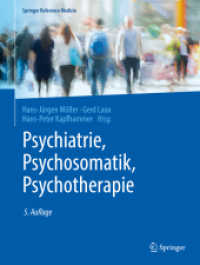- ホーム
- > 洋書
- > 英文書
- > Philosophy
Full Description
Provides the first systematic interpretation of Heidegger's relation to Eckhart, centering on the idea that we must release ourselves in order to know the truth.
In the late Middle Ages the philosopher and mystic Meister Eckhart preached that to know the truth you must be the truth. But how to be the truth? Eckhart's answer comes in the form of an imperative: release yourself, let be. Only then will you be able to understand that the deepest meaning of being is releasement and become who you truly are. This book interprets Eckhart's Latin and Middle High German writings under the banner of an imperative of releasement, and then shows how the twentieth-century thinker Martin Heidegger creatively appropriates this idea at several stages of his career. Heidegger had a lifelong fascination with Eckhart, referring to him as "the old master of letters and life." Drawing on archival material and Heidegger's marginalia in his personal copies of Eckhart's writings, Moore argues that Eckhart was one of the most important figures in Heidegger's philosophy. This book also contains previously unpublished documents by Heidegger on Eckhart, as well as the first English translation of Nishitani Keiji's essay "Nietzsche's Zarathustra and Meister Eckhart," which he initially gave as a presentation in one of Heidegger's classes in 1938.
Contents
Acknowledgments
General Introduction
Part I.
1. The Thinker and the Master: Heidegger on Eckhart
Part II.
Introduction
2. Thinking, Being, and the Problem of Ontotheology in Eckhart's Latin Writings
3. Become Who You Are: The Oneness of Thinking and Being as Releasement in Eckhart's German Writings
4. Eckhart's Strategies for Cultivating Releasement
Part III.
Introduction
5. The Middle Voice of Releasement in Heidegger's Lecture Courses, 1928-30
6. Violent Thinking and Being in Heidegger's Introduction to Metaphysics, 1935
7. Releasement as the Essence of Thinking and Being in Heidegger's First "Country Path Conversation," 1945
Conclusion
Appendix One
Materials on Heidegger's Relation to Eckhart
1. Editions of Eckhart Consulted, Owned, or Referenced by Heidegger
2. Locations of Heidegger's References to Eckhart and Pseudo-Eckhart
3. Heidegger's Citations of Eckhart and Pseudo-Eckhart
4. Heidegger's Marginalia und Underlining in His Personal Copies of Eckhart
5. Summary of Eckhart's/Pseudo-Eckhart's Texts Read or Cited by Heidegger
6. Reports on Heidegger's Relation to Eckhart
7. Heidegger's Evaluation of Kate Oltmanns's Dissertation on Eckhart
8. Heidegger's Notes on Kate Oltmanns's Oral Examination
Appendix Two
"Essentiality, Existence, and Ground in Meister Eckehart," by Kate Oltmanns
Appendix Three
"Nietzsche's Zarathustra and Meister Eckhart," by Nishitani Keiji
Notes
Bibliography
Published Primary Sources
Unpublished Sources
Secondary Sources
Index








